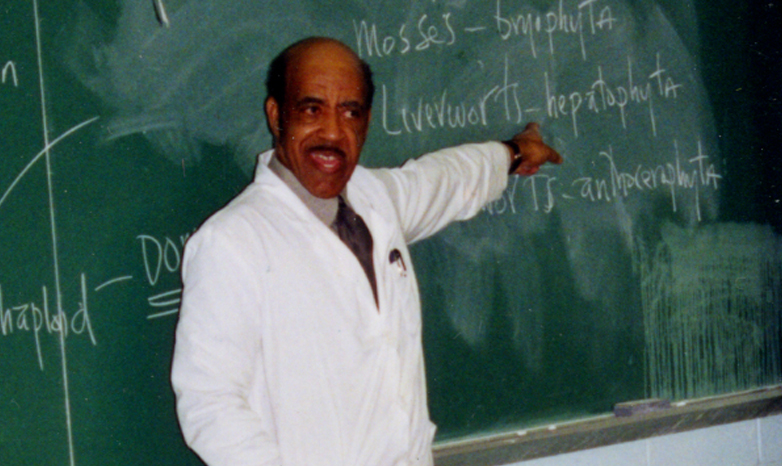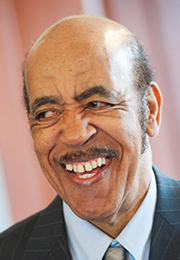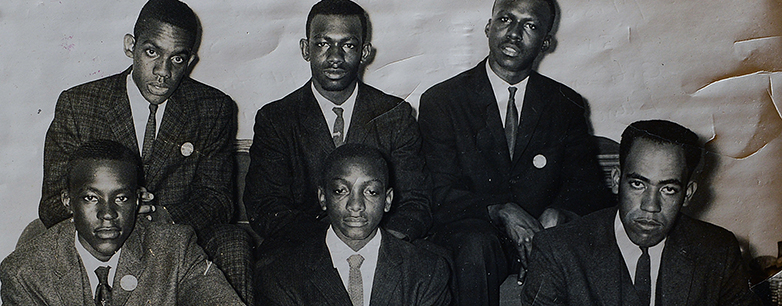Retired SRU professor, ‘Friendship Nine’ member, to speak about civil rights

Thomas Gaither, retired SRU biology professor, will speak at 7 p.m., Feb. 2 about the “Friendship Nine” and civil rights.
Jan. 16, 2017
SLIPPERY ROCK, Pa. - Slippery Rock University's arm of The Frederick Douglass Institute, in conjunction with the University's Diversity, Equity and Inclusion Leadership Team, will welcome Thomas Gaither to SRU at 7 p.m., Feb. 2 in Room 304 of the Smith Student Center for a conversation about the "Friendship Nine."
"I'm looking forward to returning to campus and speaking with everyone," said Gaither. "I'm coming back because there are questions we face as Americans in this particularly anxious period and I hope to shed light on what we are facing now by discussing our historical past."
Gaither and eight other men, that would later become known as the "Friendship Nine," were charged with trespassing for the Jan. 31, 1961, lunchroom sit-in at McCroy's 5-10-25 Cent Variety Store in Rock Hill, S.C.

GAITHER
"The situation I went through was well defined for the time," Gaither said. "It was segregation we were fighting of which there were obvious manifestations in many parts of life. Now it is subtler, but nevertheless still there. As a country, we haven't yet addressed race and racism. Things are a little better than they were in the 60s, but not a heck of a lot better."
Gaither chalks that slow-moving change to peoples "inability to be honest with each other on matters of race."
"Having an African-American president further enabled that (inability to be honest)," said Gaither. "You were seeing some of same people who were opposed to racial justice and equality now talking about our society being colorblind, which it is not."
Gaither, who spent 39 years (1968-2007) at SRU as a biology professor, said he and the "Friendship Nine" were simply "doing the right thing" within their Constitutional rights when they acted.
Gaither led the sit-in while working as a field secretary for the Congress of Racial Equality. He recruited eight students at Rock Hill's Friendship Junior College to order a hamburger, sit down and eat it inside the diner, which was at that time illegal.
According to Gaither, police shoved him to the ground after he took a seat at the "whites-only" counter. Officers handcuffed him and hauled him off to jail.
The judge sentenced Gaither and the others to either a $100 fine or 30 days on a chain gang. The group chose hard labor, ushering in the "Jail, no bail" movement that opposed giving money to governments supporting "Jim Crow" laws.

Thomas Gaither (front row, right), retired SRU biology professor, was part of the “Friendship Nine” group arrested in 1961 for a sit-in at a whites-only diner in South Carolina. The conviction was overturned in 2015 in an action the courts referred to as “righting history.”
Gaither said the men shoveled sand into trucks for 30 consecutive days. They were told it was for public works but found out later it was busy work concocted as punishment. Upon his release, Gaither continued to work for the Congress of Racial Equality.
In 2015, South Carolina Judge Mark Hayes III threw out the conviction and apologized to Gaither saying, "We cannot rewrite history, but we can right history."
"It is an honor to have Dr. Gaither share his story as a member of the 'Friendship Nine' which sparked the 'Jail without Bail' phase of the civil rights movement," said Ursula Payne, professor of dance and director of SRU's arm of the Frederick Douglass Institute Collaborative.
"We are proud that Dr. Gaither continues to be a part of the community at SRU. His work for the Congress of Racial Equality as an organizer, leader and trainer in the use of nonviolence as a social practical tactic and technique provided the framework for the impact of the Freedom Rides. It is critical for our students to have strategies for dealing with acts of violence and aggression. As racism continues to be a dividing issue in our society, the Frederick Douglass Institute at SRU is committed to enriching the campus climate through promoting American democratic ideals and courageous conversations."
A native of Orangeburg, S.C., Gaither, grew up the son of two teachers in the segregated south, saying that he learned early on that responding to injustice with anger does not break the cycle. Rather, channeling one's anger into something positive through action is the way to make a difference.
After a stint in the army in the early 1960s, Gaither went back to college and received his master's degree at Atlanta University, followed by doctorate in biology from the University of Iowa.
Gaither joined SRU, then Slippery Rock State College, in 1968. He never left until retirement, calling it his "first and only job."
SRU honored Gaither with a 2004 Pacesetter Award for his work creating diversity on campus and created a scholarship in his name. The Thomas W. Gaither Scholarship offers $1,000 annually for an entering student majoring in biology with the intention of becoming a professional biologist, biology teacher or entering the medical field.
In 2015, Gaither was honored with an honorary doctor of laws from Washington & Jefferson (Pa.) College.
"I hope those that attend my speech will understand that I'm not addressing black history, but rather American history," said Gaither. "What we protested in the 60s are the things we are still dealing with today. We still have things to work on in terms of racial relations.
"At the end of the day, we're only cheating ourselves as Americans if we don't seek to make this country the best we can and inclusive of all."
MEDIA CONTACT: Robb King | 724.738.2199 | robert.king@sru.edu

